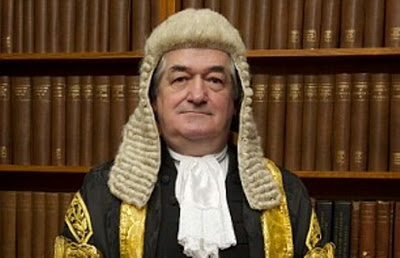Mother Agnès-Mariam de la Croix - an agent of truth and peace
Mother Agnès-Mariam de la Croix, spokesperson for the Catholic Media Centre of the Diocese of Homs, Hama and Yabroud in Syria, is one of the main representatives of the 'Mussalaha' Reconciliation inter-faith Initiative, which has the support of all Syria’s religious communities. She has been a fearless and indefatigable proponent for Syria’s persecuted.
His Grace wrote about her a few months ago: she is the nun who exposed the egregious stage-management of public opinion when President Obama, David Cameron and François Hollande were trying to justify punitive action against President Assad and his forces for the alleged use of chemical weapons. More recently, she personally brokered a ceasefire between 'rebels' and Syrian troops in Moadamiya, and thereby helped save the lives of over 2000 civilians.
Mother Agnès-Mariam has been and is being relentlessly criticised for these acts by those who are support war and oppose peace. She is still besieged by lies, libels and slanders which foment further conflict and hinder peace and reconciliation in Syria.
And no wonder the Father of Lies is irked.
Mother Agnès-Mariam demolished the credibility of the videos of the Ghouta chemical gas story. Her evidence on the veracity of the rebels’ videos was used by the Russian government in its successful efforts to forestall the USA’s planned missile strikes on Damascus. The questions Mother Agnès-Mariam raised in that interview have still not been satisfactorily answered.
How many nuns brave snipers and bombs to broker a ceasefire?
"Saturday, October 12 At 11 am Mother Agnes-Mariam and Sister Carmel went to Muadamiyet-al-Cham, on the outskirts of Damascus.. Twelve snipers were ensconced above the arcades that lead into the city. Mother Agnes-Mariam swept up a white flag and headed with determination, along with Sister Carmel, toward a group of about 40 leaders of the armed rebel bands that have been kidnapping thousands of ordinary people. Now these armed bands were also threatening.. to block off all food supplies. The ensuing confusion was indescribable, with shots being fired and shouts ringing out about how no one was to leave the place alive.There are accompanying photographs for this diary account: the BBC also recorded the peace-brokering (and there's a longer BBC Today interview, or a much fuller video link here).
"So Mother Agnes-Mariam tells Sister Carmel to pray and they begin to invoke the name of Jesus. Suddenly there is silence, and there is an opening for negotiations over the liberation of the hostages..."
Syria is a dangerous war zone: journalists who go there run the risk of death. Mother Agnès-Mariam is not 'pro-Assad', as some of them claim, but it's a handy slur to hurl at anyone who opposes the rebels’ excesses. She does not work for Assad and neither is she in cahoots with him: she simply labours for peace and reconciliation in Syria's killing fields. Allegations that she "meets daily with Ali Mamlouk, the head of Syria’s National Security Bureau, and Jamil Hasan, the head of Air Force Intelligence" are patently absurd. It is simply part of a conspiracy to discredit her, or even provoke her assassination.
And she is mocked as “Our Lady of Useful Idiocy”. Funny, isn't it, how the sympathies of some Western journalists appear to be with those who are wantonly slaughtering Christians and committing unspeakable war crimes. But the media bias is routinely with these 'rebels': the BBC gave a very easy interview to Abu Sakkar, Syria’s notorious heart-eating cannibal (yes, you read that right). Why is taxpayers' money giving a platform to such a monster?
Vladimir Putin made this very point to David Cameron at the 2013 G8 summit meeting on the day Prince George of Cambridge was born. Channel 4 enthused about their exclusive with an AK47-toting female jihadist from London who is helping to colonise Northern Syria under the flag of al-Nusra. This woman had looted and stolen, but her crimes went unchallenged during the interview.
And The Guardian deals reverently with Ali Almanasfi, who was killed in Syria fighting for al-Qaeda. Here, from Harding’s article, is some of this dead jihadist’s previous:
As a teenager, according to his friend Tam Hussein, Almanasfi drifted into trouble. He got involved in street fights with other Acton gangs and petty crime: drugs, stealing, booze. In 2008 his father sent him to Syria to cool down. Apparently this didn't work. A year later he did something he would bitterly regret: drunk, he attacked an older man. The details are hazy. But he was caught, sentenced to four or five years in jail, and initially imprisoned in Feltham young offenders institute.Mary Fitzgerald, a foreign affairs editor with the Irish Times, spent time with jihadists in Libya and then followed the same group of fanatics to Syria. She praises them, martyr-like, despite their own criminal backgrounds in Ireland. In between praising the foreign jihadists currently laying waste to Syria, Ms Fitzgerald has made unsubstantiated allegations against Mother Agnès-Mariam via Twitter.
In one instance, on learning that BNP leader Nick Griffin was in Syria as part of an EU delegation, she insinuated that Mother Agnès-Mariam invited him - despite the nun being in Australia at the time and having never heard of Griffin or the BNP. Apparently, the beheading of Christians is a baseless claim: the nun is just a religious nutter. Mary Fitzgerald is of the view that Irish jihadists are not extremists of the al-Qaeda mold: they are true martyrs for a just cause. Unsurprisingly, she is a vocal supporter of the Irish-based Muslim Brotherhood extremists who were arrested in Cairo when the Morsi regime was toppled.
There is a lesson here: if you're a servant of the Lord intent on working for peace and reconciliation in a war zone, you can expect the forces of hell to be unleashed to smear, defame and kill your reputation, if not your life.
God bless you, Mother Agnès-Mariam. May the Lord guide and protect you, and give you peace.












